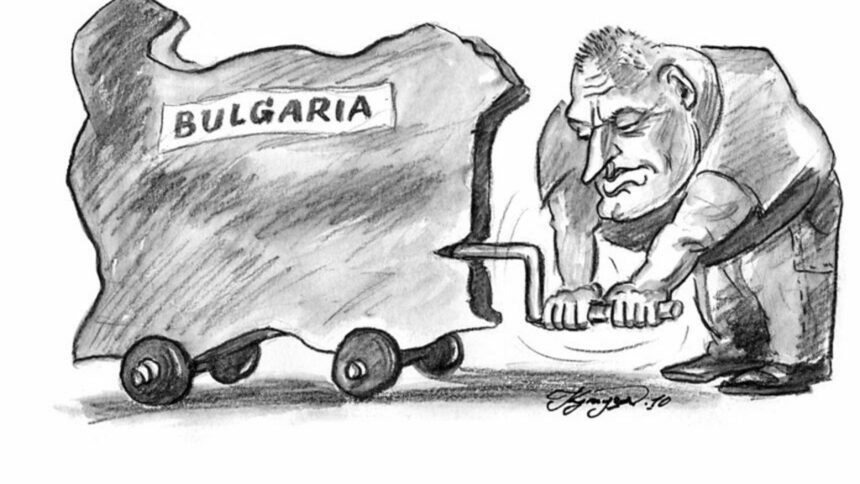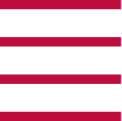
11/06/2019 BILI published the results of the specialized survey "Attitudes of Magistrates towards the Establishment of a Mechanism for Prosecuting and Disciplining of the Prosecutor General, the President of the Supreme Court of Cassation and the President of the Supreme Administrative Court"
Read the results of the specialized survey carried out by Global Metrics Ltd. on behalf of the Bulgarian Institute for Legal Initiatives in the summer of 2019 among 612 magistrates here. The main purpose of the survey was to explore the attitudes of prosecutors and judges about a topic, which is one of the corner stones of the Bulgarian judicial reform.
Articles
Bilyana Gyaurova-Wegertseder
12/01/2020 How to Hold the Prosecutor General Accountable Without Holding Him Accountable?
19/10/2020 NEW The Judicial Map - A Matter Larger that the Judge's College (EN)
12/05/2019 NEW Why Is Mr. Borissov Still Keeping his Unfit Minister of Justice! (EN)
23/04/2019 Why and how the recommendations under the CVM are distorted (EN)
24/07/2018 SJC in the Crooked Mirror of Media Populism (EN)
11/10/2017 The Supreme Judicial Council and the Election of Chair of the Supreme Administrative Court: Episode II (BG)
18/09/2017 At the Entrance and at the Exit of Each Government the Judiciary Stands (BG)
15/06/2017 The Supreme Judicial Council in An Alternative Reality (BG)
08/06/2017 Merkel's Еlegant Warning (BG)
28/01/2016 Why the Continuous CVM Monitoring Is the Better Scenario for Bulgaria (BG)
06/11/2015 Inspectorate for the Magistrates or Inspectоrate of the Deputies (BG)
27/01/2015 About the Honor of the SCC and the Fear of the SJC (BG)
02/09/2014 VISION 2020: Why It Is Good and Disturbing (BG)
09/03/2014 How to Appoint those Leadership Positions without asking the #КОЙ (who) Question (BG)
08/07/2013 The Election of New Chair of the National Health Insurance Fund. Parliament Acts like 911 - alas, not in a good way (BG)
18/06/2013 We "Can" and We "Do" in the New Parliament After Adopting Its New Rules (BG)
17/08/2011 Confiscation - Mission (Im)possible (BG)
Teodor Slavev, PhD
26/10/2020 State Budget for "Vote Buying" (EN)
27/10/2018 Double Standrads on Dondukov 2 (EN)
12/02/2018 Someone Else Somewhere Else is Stealing (BG)
31/05/2017 Upcoming Elections of Independent State Bodies. Are We Expecting a Change? (BG)
02/01/2017 Happy New 1917 (BG)
01/12/2016 Conclusions After the Presidential Elections in Bulgaria (BG)
08/10/2016 The Election of a New President - Beyond the Family Idyll (BG)
21/06/2016 The State Capture Scenario in Bulgaria (BG)
23/02/2016 Parliamentary Labor Bureau (BG)
07/01/2016 Аuthoritarian Models of Governance in Bulgaria. The Test Drive (BG)
Tsvetomir Todorov
19/11/2018 Fundamental Disciplines in Law as a Reflection of the Juridical Education (EN)
11/07/2017 The Lay judge - a Parade Piece of Decoration in the Criminal Proceedings (BG)
23/03/2017 А Pre-election Optimistic View on the Judicial Reform - full analysis (BG)
26/10/2015 Election of Lay judges? There Is No Such Thing! (BG)
Boryana Christova
25/01/2018 Тhe Аppointments Evolution (BG)
21/03/2017 The Cooperation and Verification Mechanism (CVM) - from proposals to results (BG)
11/07/2017 The Lay judge - a Parade Piece of Decoration in the Criminal Proceedings (BG)
09/02/2016 How Can We Believe in the Judiciary? (BG)
05/11/2014 Uniform Rules for the Nomination, Announcement and Appointment of State Bodies Under the Current Legislation (BG)
Neda Grozeva
25/01/2018 Тhe Аppointments Evolution (BG)
11/10/2017 Fighting Bribery: an ambition or a reality? The perspectives of ISO 37001:2016 (BG)
08/09/2017 The Trust in the Judiciary was not Given a Chance or Why Democracy is so Overrated* (BG)
11/08/2017 The Law of the Season. Is the State Building an Anti-corruption Sandy Castle (BG)
02/07/2017 Anti-corruption Talk vs. Anti-corruption Doing: a story of a whistleblower (BG)
24/12/2016 For Corruption with Love: India (BG)
15/02/2016 The Duplicitous Face of Transparency (BG)
28/10/2015 The Inspectorate with the Supreme Judicial Council Depends on Its Inspectors: or Why Procedures Shall be Pro Indeed (BG)
Events
05/07/2019
An Interview with Dr. Magnus Ohman: Why Public Funding of Parties Should be Seen as Part of the Cost of Democracy?

Dr. Magnus Ohman
BILI is a partner organization for Bulgaria in the international project "Effective Combat Against Corruption. Supporting Stakeholders in Implementing Anti-Corruption Standards." The project is implemented by the International Foundation for Electoral Systems (IFES) and CEELI Institute Prague with the support of DoJ-INL. The project is implemented in Bulgaria, Romania and Montenegro.
In the light of the current events related to party financing we have spoken with Dr. Magnus Ohman. Dr. Magnus Ohman is the director of the IFES Regional Europe Office in Prague, the Czech Republic. He has worked on political finance issues since the late 1990s, specializing in effective disclosure and oversight, public funding systems and sustainable solutions. Ohman holds a Ph.D. in political science from Uppsala University, Sweden. Read his full biography here.
BILI: We all know that the political parties are the "necessary evil" in a liberal democratic system, however do you think that there is a trend for a negative attitude towards the political parties in the recent years?
MO: The level of trust in political parties has been declining for decades, so this is nothing new. In the latest Eurobarometer, based on a survey from November 2018, only 18% argued that they have trust in political parties (11% in Bulgaria). See pg. 39 in the source below.
BILI: Do nations and societies differ in their attitude to the political parties?
MO: Yes, this varies widely. For recent data see page 45 on: https://ec.europa.eu/commfrontoffice/publicopinion/index.cfm/ResultDoc/download/DocumentKy/86437.
BILI: In 2016, in Bulgaria a nationwide referendum was initiated along with presidential elections. Approximately 3.5 million people casted their vote on the question if the state subsidy for political parties shall be reduced to 1 BGN per vote (from 11 BGN). 72% of those who voted supported the idea and voted in favor of that proposal. What is your comment on this outcome?
MO: When the public has been asked about their view of public funding in different countries, they have normally been negative. This is understandable, as public funding means that taxpayers’ money that could go to building hospitals or schools are instead given to political parties that the people do not trust (see above). It should be considered however that maybe public funding of parties should be seen as part of the cost of democracy, if it can help to level the playing ground and reduce the influence of wealthy interests over the political process. It can be noted that in recent years, some European countries such as Italy, have significantly reduced the public funds provided to political parties, while others, such as North Macedonia and Romania, have significantly increased public funding in recent years.
BILI: There has been a recent scandal in Bulgaria regarding the state subsidy for political parties. It occurs that those who fulfill the eligibility criteria, have received approximately 13 BGN per vote rather than 11 BGN as it is prescribed in the law. That triggered a public debate on the mechanisms for financing of political parties. Can you say what are the most important principles that govern political financing in general?
MO: It can be argued that the most important principle in European political finance regulation is transparency in how those wishing to run the country raise and spend money. The implication of this is the need for detailed financial reports that are made available to the public in a timely manner and in user-friendly formats. Different regulations are used in different countries to reduce the influence of wealthy interests and to level the electoral playing field. These regulations include donation and spending limits as well as public funding, though it should be noted that there is no European consensus on the use of such regulations. The most common of these regulations is public funding of political parties, used now in all European countries apart from Belarus, Italy, Malta, Monaco and Switzerland (and it supposed to be introduced in Malta).
BILI: How to decide on the exact amount?
MO: The exact amount should be determined based on the goal that the public funding is set to achieve, and the current practices and levels of income and spending.
BILI: There has been a political dispute on the issue. The right-wing ruling party, GERB, suddenly decided to act according to the referendum’s results three years earlier and now they support a state subsidy of 1 BGN per vote. Other political parties went even further proposing zero state subsidy but opening political parties financing to natural persons and companies without limits. They claim that this is the "American model."
MO: Such a model would differ significantly from that in the US. There, private persons are not allowed to donate more than USD 200 to an electoral campaign, and corporate donations are banned. What is being referred to is presumably donations to third parties engaging in election campaigns. In the US system, these are normally regulated as Political Action Committees (PACs), and so-called Super-PACs are allowed to receive almost unlimited donations (though it should be noted that such Super-PACs are banned from coordinating their campaign activities with parties and candidates. There is nothing specific about this model though, as donations to so-called third parties are unregulated in most European countries. The main way that party funding in the US differs from that in Europe is the absence (almost) public funding in the US, while public funding is the main source of party income in most European countries. There are exceptions in Europe however, with the UK, and recently Italy, being the main examples.
BILI: Is there a best model how to finance political parties?
MO: There can never be one "best model", as each country must adjust its regulations both to its political and economic situation, but also with the perceived goals and views of the democratic process.
BILI:What are the risks of introducing private donations to political parties? Can this threaten the legislative process?
MO: With some very rare exceptions (normally in un-democratic countries), private donations are allowed to political parties and election campaigns.
There is always a risk that private donations can interfere with governance, for example regarding what laws that are passed or the public procurement process. Donation limits can play a role in limiting this risk, though transparency in where the money for campaigns is coming from is arguably more important.
BILI:According to the Bulgarian law, political parties can spend the state subsidy for "political activities", however, the law lacks a clear definition what political activities include. Do you think such definition is necessary?
MO: Most countries do not regulate the use of public funding, other than that, like all public funds, it cannot be used for personal enrichment. Whether a definition should be used, and what in that case it should be, depends on the goals that the public funding is set to achieve. Some countries earmark a part of the funds for goals considered especially important, such as for activities to increase gender equality within political parties and in the political process.
BILI: It is of common belief that political parties in Bulgaria have the so called "black safes" and that they gather and distribute money from oligarchs which are not officially accounted and declared. How can this be investigated and how to perfect the control and sanctioning mechanisms?
MO: A comprehensive approach is needed to monitor potential flows of illicit funds into politics. The formal political finance oversight structures have an important role to part in this, but this will never be sufficient. In-depth work by financial sectors of the police force is essential, as normally only they have the resources to track financial flows in a manner that may be necessary. Specific due diligence requirements for banks dealing with politically exposed persons and institutions connected with political parties and election campaigns may also be necessary, as will be an effective whistle-blower protection system. In addition, investigative journalism can play a crucial role in tracking financial flows and make scandals known to the public, together with civil society organizations working in various related areas.
BILI: According to GRECO’s reports, Bulgaria fails to secure that political parties and candidates do not abuse state resources for their activities, including during election campaigns. Although, the Electoral Code was amended and now there is a prohibition of such abuse, there are many examples for abusing state resources by politicians. How this can be changed?
MO: Abuse of state resources has proven one of the most pervasive political finance problems in many European countries. Addressing it requires a combination of efforts. Legislative bans on supporting certain parties with public resources are useful, as are bans on increasing public spending ahead of elections aimed at increasing support for the government, and through that for the government party or parties. However, legal provisions will not be enough (especially as they are seldom enforced in practice). It is also important to build a sense of professional pride in the civil service, meaning that people in the public sector will refuse to obey requests to use the resources under their control for political purposes. This must be supported by media and civil society monitoring, so that cases where people in the public sectors being punished for refusing to abuse state resources are brought to the attention of the public. Ultimately, the goal is a situation where the electorate is not impressed by abuse of state resources. The resources of the state are the resources of the people, and abuse of state resources therefore effectively means that the people are bribed with their own money. People should react with anger when roads are fixed shortly before an election, since that means that road maintenance is done accordingly to the traffic needs of the people, which means a waste of public resources. When people are no longer impressed by such efforts, abuse of state resources will become an ineffective approach, and will gradually go away. Of course, reaching this situation may take a long time.
BILI: All parties that receive any kind of support by the state are subject to an independent financial audit, apart from the checks that the National Audit Office conducts. However, the conclusions from those financial audits are very vast and shallow and fail to provide enough information to the wider public. Are there any specifics in auditing political parties?MO: Audits of political party and campaign accounts can be an important part of increasing transparency to political finance and ensuring compliance with regulations. To do this, national auditing standards should be followed strictly. There is however sometimes a misunderstanding about what audits can add to the process of political finance oversight. Auditors are legally required to follow strict rules in their work – they are often not required, sometimes not even allowed, to broadly look for information and to investigate potential links. In an audit of a campaign account, for example, the auditor would normally not look at financial flows formally unconnected to the election campaign that may have benefitted it electorally. As a consequence of this, auditing of financial reports can only be one part of wider oversight of political party or campaign finance.
BILI: Why should people care about political finance – how is the role of money in politics relevant for the everyday life of ordinary people?
MO: Political finance is important to the everyday life of ordinary people because it relates directly to how elected politicians behave. Do politicians act in the interest of the people, or do they seek to give favour to those who supported them in the last election campaign? Do public contracts for road maintenance go to the company that can do the best job using the minimum amount of tax funds, or do such contracts go to companies with close ties to involved politicians? The temptations to engage in corruption will always be present, and the risk of politicians acting against the public interest can never be removed completely. However, efforts to increase transparency in political finance and enhance compliance with political finance regulations can reduce these risks and strengthen accountability in politics.
08/01/2017
Judge Anatoli Bobokov is the Selected Fellow to Join the Visiting Foreign Judicial Fellows Program Hosted by the Federal Judicial Center (FJC)
The Visiting Foreign Judicial Fellows Program offers foreign judges, court officials, and scholars an opportunity to conduct research at the Center on topics relating to the administration of justice in the United States. The FJC received many applications from qualified Bulgarian magistrates. The selected candidate is Judge Anatoli Bobokov (1984), serving at Bourgas District Court as a criminal judge since 2012. Prior to that he has experience as lawyer and legal advisor. He is a graduate of Rousse University Law Faculty. The research topic of Judge Bobokov’s proposal is "The Clarity of Judicial Acts and the Communication Strategy of Judicial Authorities with the Media and Society”. We wish him a successful and productive stay in the United States.
26/09/2017

On September 26, 2017 Tsvetomir Todorov, who is coordinator of the “Lay Judges – active citizens for real participation in justice" project presented a report during the round table “120 years After the First Lay Judges Law”. The first lay judges law in the Bulgarian history was voted on February 22, 1987. Mr Todorov presented his findings and opinions after the amendments in the Judiciary System Act. “The lay judges institute in Bulgaria is a reflection of our society and the general state of the judiciary. From sociological point of view that means the following: population is aging, most of the lay judges are also old. Most judges are women, women also dominate this institute. Roma minorities are not active in our civic life and we will rarely see Roma people as lay judges.”
06/09/2017

BILI published profiles of all 18 parliamentary nominees for members of the SJC following the Transparent Judicial Appointments Initiative methodology. 11 (6 will be elected) are candidates for the judicial chamber and 7 (5 will be elected) for the prosecutorial chamber. The purpose of the profiles is to present in a systematicаl and understandable manner the information about candidates. Since 2012 the "judicial profiles" are reliable and respected source of data regarding leadership formation procedures in the judiciary. The composition of profiles is part of the TJAI strategy to promote high standards in the recruitment procedures in the judiciary.
23/04/2017
Under the American Judges for Bulgaria Network Justice Richard L. Gabriel from the Colorado Supreme Court visited Bulgaria. During his stay he visited Varna and Burgas where he met not only with judges, but also with attorneys and prosecutors. Justice Gabriel touched on topics which were of importance to the Bulgarian judges – self-governance, performance evaluation, election, individual plans for improving the performance and mediation. Everywhere, he was warmly welcomed and the meetings achieved their purpose – to have a professional, collegial and interesting discussion.
19/12/2016

On December 19 BILI hosted the conference "One year after the Constitutional amendments - what is done and what is yet to come". The conference is the first professional follow up after the amendments. The conference provided floor to magistrates, politicians, academia and civic activist to present their opinions and evaluations of the effect of the changes. Key topics:functionality of the SJC after the two-chamber division;the parliamentary quota in the Council; judicial reform advancement and obstacles; general state of the rule of law in Bulgaria.
29/12/2017

The Director of the Bulgarian Institute for Legal Initiatives has been featured in Forbes. Ms Bilyana Gyaurova-Wegertseder shared the story of the Institute in the special annual ForbesWowan issue for Bulgaria. Bilyana said that he core cause of her work is the goal of a normal life in a normal country, where rules are followed as it is supposed to be. She revealed some of the key legal initiatives she contributed to throughout the years. For example, the establishment of mediation as alternative dispute resolution method in Bulgaria.
01/11/2017

Image: The American Law Institute
The U.S. Bankruptcy Judge Elizabeth S. Stong for the Eastern District of New York is visiting Bulgaria at our invitation. Her visit is part of the "American Judges for Bulgaria Network" project supported by the America for Bulgaria Foundation. Judge Stong will be meeting magistrates, the ombudsman and lawyers with whom she'll discuss bankruptcy, mediation and other important issues for the judiciary. Judge Stong is active in international judicial capacity building and has trained judges on five continents, including in Central Europe, North Africa, the Middle East, and the Arabian Peninsula, as an expert with the World Bank, the International Finance Corporation, and U.S. Department of Commerce Commercial Law Development Program. She has also consulted with the Supreme Court of China and People’s High Courts in Beijing and Guangzhou, and has participated in judicial workshops in Cambodia, Brazil, Argentina and Chile. She is an elected member of the European Law Institute and an Adviser to the ELI-UNIDROIT Principles of Transnational Civil Procedure project.
18/09/2017
_1505832649.jpg)
Bilyana Gyaurova-Wegertseder was invited by the Supreme Judicial Council (SJC) to join the final session of the Civic Council with the SJC. The session was held on September 18. Bilyana presented the answers of the judicial nominees regarding their future work as SJC members and cooperation with the Civic Council. She emphasized on the necessity of good, active and professional dialogue between NGOs and judiciary. Answers of the magistrates are available in Bulgarian here.
12/07/2017

BILI organized a civic hearing of the candidates for the SJC, nominated by the Parliament. The hearing was an opportunity for the candidates to present themselves, their concepts and vision on the work of the SJC and motives to enter the procedure in a calm and friendly environment. 3 of the nominees responded to our invitation as well as current members of the SJC, MPs, magistrates, media representatives and legal experts.
06/07/2016
BILI celebrated its 10 years anniversary! We are grateful for all the support and partnerships built during the past 10 years with state respresentatives, other think tanks, media and private sector. We all have worked very hard and shared common efforts towards a positive change in the public life in Bulgaria. We know that change takes time, continious efforts and strong motivation. We'll keep doing our best. Thank you! #10years of knowledge #10years searching for new solutions #10years Bulgarian Institute for Legal Initiatives.
27/09/2016

On September 27-28 we hosted the The Alpha to Omega Academy of Social Entrepreneurship. The Academy initiated by Neda Grozeva encompassed education, global experience and networking in the discourse around the growth and development of social entrepreneurship in Bulgaria. Our speakers were Nwabisa Mayema (SA), Ismail Lahsini (MAR), Camila Urzua (CL), Chenjerai Katanda (ZW). Key topics: Financial Courage; Currency of Networks; Addressing Social Issues through Innovation. Watch ALL lectures here.
Positions
02/10/2019 OPEN LETTER - Position of Civic Society Organizations against Attempts of Political Parties and their Leaders to Exercise Pressure over the Civil Society (at present signed by more than 90 organizations).
21/09/2017 MEMORANDUM of Bulgarian NGOs.
American Judges for Bulgaria Network - Visiting Judges
Judge Gabriel

Photo: Colorado Judicial Branch
In April 2017 Justice Richard L. Gabriel from the Colorado Supreme Court visited Bulgaria. During his stay he visited Varna and Burgas where he met not only with judges, but also with attorneys and prosecutors. Justice Gabriel touched on topics which were of importance to the Bulgarian judges – self-governance, performance evaluation, election, individual plans for performance improvement and mediation. Everywhere, he was warmly welcomed and the meetings were conducted in a professional, collegial fashion, turning into interesting discussions.
CV
Date of Judicial Appointment: June 23, 2015
Career
Appointed by Governor John Hickenlooper to the Colorado Supreme Court June 23, 2015. Judge, Colorado Court of Appeals (2008-2015). Private practice (1988-2008): Partner (1994-2008) and Associate (1990-94), Holme Roberts & Owen LLP, Denver, CO; Associate, Shea & Gould LLC, New York, NY (1988-90). Practice focused on commercial, intellectual property, probate, and products liability litigation, all including appeals. Also served as City Prosecutor for Lafayette, Colorado. Judicial clerkship (1987-88): Law clerk, Hon. J. Frederick Motz, U.S. District Court, District of Maryland, Baltimore, MD.
Education
B.A. cum laude in American Studies from Yale University (1984); J.D. from University of Pennsylvania School of Law (1987). Articles editor, University of Pennsylvania Law Review (1986-87). Winner, Keedy Cup Moot Court Competition (1987).
Professional
Admitted to state bars of New York (1987) and Colorado (1990) and to numerous federal district and appellate courts, including the U.S. Supreme Court. Member: American, Colorado, Denver, and New York Bar Associations. Honors: Champion for Children, Rocky Mountain Children's Law Center (1997); Forty Under 40, Denver Business Journal (2002); Richard Marden Davis Award, Denver Bar Foundation (2002); Colorado Super Lawyer (2007-08); Chambers’ Leading Lawyers for Business (2007-08); Intellectual Property Lawyer of the Year, Law Week Colorado (2007); Named as a Lawyer of the Year, Lawyers USA (2007); Denver Bar Association Award of Merit (2014).
Civic
Chief Justice's Commission on Professional Development (member, 2011-present; chair, professionalism working group, 2014-15); CBA Board of Governors (DBA representative, 2010-12, 2014-16; vice president, 2012-13); DBA Board of Trustees (2013-present), CBA/DBA Professionalism Coordinating Council (member, 2009-present); CBA Judicial Liaison Section (member, 2008-present; secretary, 2013-15; vice chair 2016-present); American Bar Foundation (fellow, 2013-present); Colorado Bar Foundation (fellow, 2003-present); Colorado Judicial Institute (director, 1999-present, vice chair, 2001-02, chair, 2004-06); Our Courts (executive committee, 2008-present, federal courts committee, 2007-08, content committee chair, 2009-present, chair, 2015-present); Minoru Yasui Inn of Court (member, 2009-present, vice president, 2012-13, president, 2013-2014); Colorado Wind Ensemble (trumpeter, 1990-present, director, 1993-2008, president, 1994-2008); Colorado Lawyer (Civil Evidence column editor, 1992-96, Civil Litigator column editor, 1996-2005).
Publications
"The Strickland Standard for Claims of Ineffective Assistance of Counsel: Emasculating the Sixth Amendment in the Guise of Due Process," 134 U. Pa. L. Rev. 1259 (1986); "Rule 702: Admissibility of Expert Testimony Regarding Eyewitness Identification," 21 Colo. Law. 927 (1992); "Rule 1006: Admissibility of Summary Evidence," 22 Colo. Law. 35 (1993); "Rule 501: The Privilege of Self-Critical Analysis," 23 Colo. Law. 1291 (1994); "Rule 615: Exclusion of Witnesses," 24 Colo. Law. 1299 (1995); Book Review, "Modern Evidence: Doctrine and Practice," 25 Colo. Law. 48 (1996); Co-author, "Chapter on Rule 26," Colorado Civil Procedure Forms and Commentary (Debra Knapp ed. 1996); "Rule 606(b): Competency of Jurors as Witnesses," 25 Colo. Law 47 (1996); "Professionalism in Today's Competitive Legal Market," 39 Colo. Law. 65 (2010); Co-author, "The Mentoring Relationship: How to Make it Work and Why it Matters," 42 Colo. Law. 53 (2013); Co-author, "Caveat Advocatus: Some Traps for the Unwary in the Colorado Court of Appeals," 44 Colo. Law 51 (2015); numerous continuing legal education papers (1990-present).
Personal
Justice Gabriel was born in Brooklyn, NY. He and his wife have two daughters.
Source: Colorado Judicial Branch
Gallery

Judge Gabriel at the Sofia Regional Court
Judge Gabriel and judges from Varna
Meeting with judges from Varna

Meeting with Supreme Judicial Council Members

Judge Gabriel with Burgas Appellate Court Chief judge

A courtroom in Bulgaria, Blagoevgrad
Judge Stong

The beginning of November was marked by the visit of U.S. Bankruptcy Judge Elizabeth S. Stong for the Eastern District of New York. Judge Stong spent a week in Bulgaria and during her visit had a number of interesting and inspiring meetings with judges, attorneys, members of the Supreme Judicial Council and the National Ombudsman.
Judge Stong talked about her professional path from a corporate attorney through mediator and bankruptcy judge. She shared her views on the courts as problem-solvers and explained the role of judges in this process. Judge Stong conveyed her enthusiasm for mediation as a means to not only resolute a dispute, but also help parties reach the best decision with the help of the judge as a neutral voice in the courtroom.
CV
Judge Elizabeth S. Stong has served as U.S. Bankruptcy Judge for the Eastern District of New York since 2003. Before entering on duty, she was a litigation partner and associate at Willkie Farr & Gallagher in New York, an associate at Cravath, Swaine & Moore, and law clerk to Hon. A. David Mazzone, U.S. District Judge in the District of Massachusetts.
Judge Stong is a member of the Council on Foreign Relations and the Council and Membership Committee of the American Law Institute. She is also a Trustee and member of the Executive Committee of the Practising Law Institute, a member of the board of P.R.I.M.E. Finance, an international dispute resolution organization that promotes judicial education in complex financial disputes, and a member of the Board of Directors of the Harvard Law School Association of New York City. She is co-chair of the New York Fellows of the American Bar Foundation, serves on the ABA Standing Committee on Pro Bono and Public Service, represents the ABA’s National Conference of Federal Trial Judges in the ABA House of Delegates, and is a member of the Council of the ABA Business Law Section. She serves as co-chair of the New York City Bar Council on the Profession, a member of the New York County Lawyers Association Justice Center Advisory Board, and a board member of the New York Law Institute. She is an adjunct professor at Brooklyn Law School and St. John’s University School of Law.
Judge Stong is active in international judicial capacity building and has trained judges on five continents, including in Central Europe, North Africa, the Middle East, and the Arabian Peninsula, as an expert with the World Bank, the International Finance Corporation, and U.S. Department of Commerce Commercial Law Development Program. She has also consulted with the Supreme Court of China and People’s High Courts in Beijing and Guangzhou, and has participated in judicial workshops in Cambodia, Brazil, Argentina and Chile. She is an elected member of the European Law Institute and an Adviser to the ELI-UNIDROIT Principles of Transnational Civil Procedure project.
Judge Stong previously served as President of the Harvard Law School Association, chair of the International Judicial Relations Committee of the National Conference of Bankruptcy Judges, Vice President of the Federal Bar Council, Vice President of the Board of Directors of New York City Bar Fund Inc. and the City Bar Justice Center, Chair of the New York City Bar’s Alternative Dispute Resolution Committee and Vice Chair of its Judiciary Committee, the Board of Directors of the International Insolvency Institute, and an officer of the ABA Business Law Section. She was also a member of the board of MFY Legal Services, Inc., one of the largest providers of free civil legal services to low-income residents of New York City, and served on the ABA’s Standing Committee on the American Judicial System, Standing Committee on Continuing Legal Education, Commission on Women in the Profession, and Commission on Homelessness and Poverty.
Judge Stong received the Brooklyn Bar Association’s Freda Nisnewitz Award for Pro Bono Service, the New York Institute of Credit’s Hon. Cecelia H. Goetz Award, the ABA Business Law Section’s Glass Cutter Award, and the MFY Legal Services Scales of Justice Award, among other recognitions.
Judge Stong received her A.B. magna cum laude and her J.D. from Harvard University.
October 2017
Gallery

Meeting with members of the Supreme Judicial Council

Meeting with members of the Supreme Judicial Council

Business breakfast "Business, mediation, benefits – a view from the bench"

Business breakfast "Business, mediation, benefits – a view from the bench"

Meeting with attorneys

City break @ the Sofia City Art Gallery
Judge Calabrese

Photo: The Guardian
In April 2018 judge Alex Calabrese, Supreme Court Justice and Presiding Judge of the Red Hook Community Justice Center, visited Bulgaria. Judge Calabrese met with colleagues and representatives of local communities in Lukovit, Rousse, and Sofia. He shared his extensive experience in community courts and the remarkable results Red Hook has shown in reducing recidivism, incarceration, and increasing satisfaction among court users. At the community justice center, he hears Criminal, Family and Housing Court cases, and uses services such as drug and mental health treatment, peer court, education and training programs and peacemaking.
The Justice Center is a one-judge court and the first multi-jurisdictional court in the United States. Its mission is to identify and address the issue(s) that brought the offender to court to reduce recidivism and offenders recycling through the court system.
CV
Alex M. Calabrese was appointed to the bench in 1997 to the Criminal Court for the City of New York by Mayor Rudy Giuliani and re-appointed subsequently by Mayors Michael Bloomberg and Bill de Blasio. In April of 2000, he was named to be the Presiding Judge of the Red Hook Community Justice Center. At the same time, he was also appointed as an Acting Supreme Court Justice for the State of New York. This is the highest trial level for judges in New York State.
The Justice Center is a one-judge court and the first multi-jurisdictional court in the United States, with Criminal, Family and Housing Court cases heard in its one courtroom. While respecting the accused’s constitutional rights, the presiding judge is able to resolve cases pre-trial or at sentence with an array of sanctions and services which include community service, drug and mental health treatment, trauma counseling, youth services, peer court, education and training programs and peacemaking. The Justice Center’s mission is to identify and address the issue(s) that brought the offender to court to reduce recidivism and offenders recycling through the court system.
The Justice Center is viewed as the leader of the community court movement and community courts based on its model have opened across the United States and around the world. This problem-solving approach has received national and international attention and visits from high level government officials, United States and international chief justices and other dignitaries. The success of the Justice Center was documented in an independent evaluation by the National Institute of Justice and the National Center for State Courts. The Justice Center serves as the model for reducing incarceration and served as the template for “Supervised Release,” a program used daily throughout courts in New York City to reduce pre-trial incarceration.
The Justice Center has received numerous awards, including the 2006 Problem-Solver Award from the American Bar Association, the 2008 NCJA Outstanding Program Award, the 2013 Robin Hood Heroes Award and the 2014 CEI Education Award (the first courthouse to receive each of these awards). The Red Hook Community Justice Center was the subject of a Frontline PBS Special, Red Hook Justice and several other media profiles.
Judge Calabrese is an expert on community courts and has presented nationally and internationally on community justice, problem-solving courts, procedural justice/fairness principles and reducing incarceration. He co-authored a treatise entitled, “Criminal Law and Practice,” which is revised and published annually by the New York State Bar Association. He was an Adjunct Professor, teaching Therapeutic Jurisprudence at the New York University Graduate School of Social Work for over 10 years.
Gallery

Round table in Lukovit

Presentation on community court, Lukovit

Judge Calabrese with Lukovit Regional Court Chief judge

Judge Calabrese in front of the Court House in Rousee

Discussion with judges after presention at the Sofia Regional Court

Judge Calabrese with Sofia Regional Court Chief judge and his deputies
Infographics












.png)













